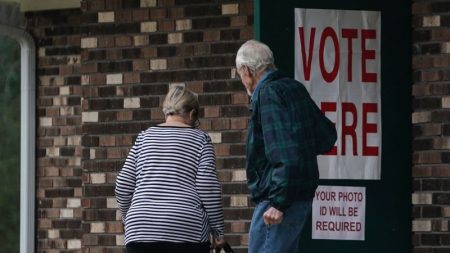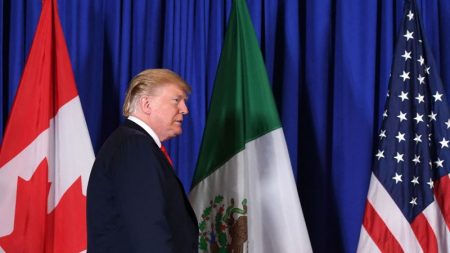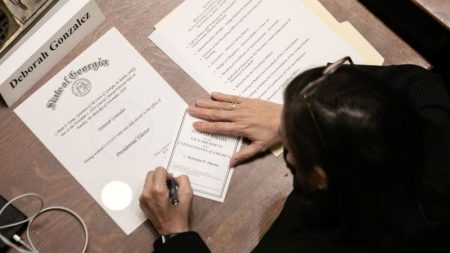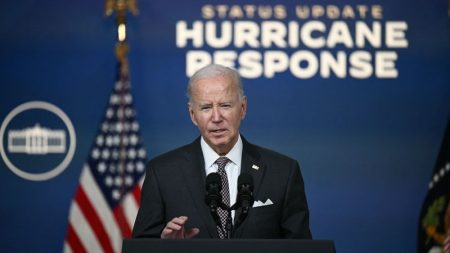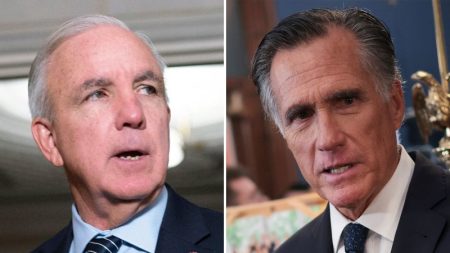Secretary of State Antony Blinken traveled to Israel Friday to press the Israeli government on its ongoing offensive in Gaza amid growing international condemnation and a steadily mounting civilian death toll.
The top US diplomat, who traveled twice to Israel last month in the wake of the deadly Hamas attack, will meet with Prime Minister Benjamin Netanyahu and other senior officials as the US government continues to attempt balancing support for Israel’s defense with an increasingly public call for them to protect civilians.
In remarks to the press before departing Washington, DC, Thursday, Blinken said he planned to talk to the Israeli government about “the ongoing campaign against the Hamas terrorist organization” and “steps that need to be taken to protect civilians.”
He also intends to discuss, as he did in past trips, the hostages being held by Hamas and the prevention of a wider regional conflict.
Blinken declined to go into detail about the “concrete steps” to better protect civilians, nor would he provide a direct answer when asked whether Israel has shown restraint in its offensive so far. Instead, he said that this was “a crossfire of Hamas’ making,” condemning the terrorist group for “cynically and monstrously” using civilians as human shields and embedding its fighters within civilian infrastructure.
“When I see a Palestinian child, a boy or girl, pulled from the rubble of a collapsed building – that hits me in the gut as much as seeing a child in Israel or anywhere else,” Blinken said. “This is something that we have an obligation to respond to, and we will.”
Privately, officials across the US government have warned their Israeli counterparts about the impact of such images – and the importance of allowing humanitarian aid in – on their ability to pursue their strategic aims as international condemnation grows wider and louder.
“We are constantly saying you’re not going to have the time and the space to do what you want to do if these images just keep coming out day after day of the death and destruction that’s happening inside of Gaza,” a source familiar said, alluding to the US experience with Mosul, Aleppo and Fallujah. “It’s a message that is repeated at all levels all day, every day.”
Arab partners in particular have voiced immense criticism of Israel’s campaign in Gaza and Jordan and Bahrain have recalled their ambassadors.
The continued flow of that humanitarian aid and ongoing departure of civilians will be another key focus of his conversations in Israel, Blinken said Thursday.
Civilians, including American citizens, were able to leave Gaza via the Rafah Gate to Egypt starting on Wednesday, and officials said departures were expected to continue over the coming days.
Still, it was a painstaking, weeks-long process to get to that point, one that required significant high-level US pressure on the parties involved.
A steady stream of trucks carrying assistance have been able to enter in the past week, but US officials including Blinken have stressed that it is not nearly enough. Israeli officials have also limited the entrance of fuel into Gaza, arguing that Hamas has stolen large quantities and withheld it from civilians.
Aid and medical workers have stressed the dire need for the fuel to keep hospitals running, and the matter is expected to be raised by Blinken in his meetings Friday. The source familiar told CNN that the issue has been raised at senior levels.
Blinken’s third priority for his stop in Israel is to discuss “the day after” – “how we can set the conditions for a durable, sustainable peace; durable, sustainable security for Israelis and Palestinians alike,” he said Thursday.
The top US diplomat has said repeatedly that there cannot be a return to the “status quo” with Hamas, and Israeli officials have said they intend to eliminate the group from Gaza.
In congressional testimony on Monday, Blinken said that Israel cannot run or control Gaza, noting, “That’s not their intent, it’s not what they want to do, and it’s not something that would be supported.”
“At some point, what would make the most sense would be for an effective and revitalized Palestinian Authority to have governance and ultimately security responsibility for Gaza,” he said.
“Whether you can get there in one step is a big question that we have to look at. And if you can’t, then there are other temporary arrangements that may involve a number of other countries in the region. It may involve international agencies that would help provide for both security and governance.”
In his conversations in Israel, Blinken said he expected a particular focus on “how we can get over time to two states for two peoples.” Still, the goal of a two-state solution seemed particularly distant given the ongoing offensive in Gaza and the growing Israeli settler violence in the West Bank.
State Department spokesperson Matt Miller on Wednesday said that the US has “made quite clear to the government of Israel that we are very concerned about settler violence in the West Bank.”
“We find it incredibly destabilizing. We find it counterproductive to Israel’s long-term security in addition to, of course, being extremely harmful to Palestinians living in the West Bank,” he said at a department briefing.
“We have sent a very clear message to them that it’s unacceptable, it needs to stop, and those responsible for it need to be held accountable,” Miller said.
Read the full article here





